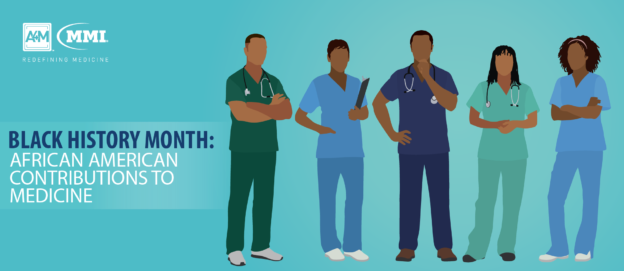The month of February celebrates Black History Month, a tribute to African American men and women whose achievements helped shape U.S. history. As part of this annual commemoration of their successes, we honor the profound contributions of African American physicians and health care professionals in the medical field. The following pioneers were instrumental in advancing modern medicine; they not only fought slavery and advocated for racial equality, but also contributed groundbreaking research and novel approaches to patient care that have shaped the clinical practice of today.
Rebecca Lee Crumpler, MD
Dr. Rebecca Lee Crumpler became the first African American woman in the United States to earn a medical degree; she graduated from the New England Female Medical College in Boston in 1864. Afterward, Crumpler worked with other African American physicians caring for formerly enslaved people in the Freedmen’s Bureau. In 1883, she published A Book of Medical Discourses: In Two Parts, a text that details children’s and women’s health intended to spread medical knowledge to mothers.
James McCune Smith, MD
New York City native physician and scholar Dr. James McCune Smith was the first African-American man to earn a medical degree. After being denied college admission in the United States, Dr. Smith pursued a medical degree in Scotland, which he obtained in 1837. Smith was the first African American physician to publish articles in American medical journals, including texts on science, education, and racism. He was also the first African American to own and operate a pharmacy in the United States.
Myra Adele Logan, MD
Dr. Myra Logan was the first woman and ninth person in the world to perform open-heart surgery in 1943. Her research efforts focused on antibiotic and breast cancer studies; she helped developed more accurate testing measures to detect density differences in breast tissue. Dr. Logan also worked as a surgeon at the Harlem Hospital in New York and was the founding partner of the first physicians group practice in America.
Charles Richard Drew, MD
Dr. Charles Drew was the first physician to use blood plasma for transfusion, pioneering methods of storing blood and developing the first large-scale blood bank in the United States during WWII. He received his M.D. and Master of Surgery from McGill University in 1932. Dr. Drew was the first Director of the American Red Cross Blood Bank, served as Chief Surgeon at Freedmen’s Hospital, and became the first African American examiner of the American Board of Surgery.
Mary Eliza Mahoney
Mary Eliza Mahoney began her groundbreaking nursing career as an untrained practical nurse serving affluent white families in New England. Mahoney was the first African American professional nurse as well as the first African American to be admitted into the nurse training program at the New England Hospital for Women and Children. Upon graduating, she went on to work as a private care nurse before co-founding the National Association of Colored Graduate Nurses. Largely due to her efforts, the number of African American nurses doubled from 1910 to 1930 and she made history by raising the status of nurses of color in the profession for decades to come.
Leonidas Harris Berry, MD
A renowned gastroenterologist, Dr. Leonidas Harris Berry was the first African American physician on staff at the Michael Reese Hospital in Chicago. Dr. Berry directed his efforts at promoting racial equality in the hospital setting and increasing the amount of facilities in underserved parts of the city. In 1970, Berry helped organize a group of practitioners – called the Flying Black Medics – who flew to the remote community of Cairo, Illinois to bring medical care and health education to the population.
Patricia Era Bath, MD
As the first African American to complete an ophthalmology residency, Dr. Patricia Era Bath noticed disparities in the rates of blindness and visual impairments between white-dominated Columbia eye clinic and the primarily black patient base of Harlem Hospital’s clinic. Dr. Bath conducted a study that found the prevalence of blindness was two times higher in African Americans than in whites, a finding she investigated for the remainder of her career. Later on, Bath co-founded the American Institute for the Prevention of Blindness and became the first woman appointed chair of ophthalmology at an American medical school. Dr. Bath was also the first African American physician to receive a medical patent in 1988 for the Laserphaco Probe – a device for cataract surgery.
Alexa Irene Canady, MD
Dr. Alexa Irene Canady became the first African American neurosurgeon in the United States in 1981. Shortly thereafter, she was appointed the chief of neurosurgery at the Children’s Hospital of Michigan, where she worked for decades in the pediatric department. She is revered for her patient-focused approach to care, which allowed her the opportunity to grow her career exponentially in spite of prevailing racial tension.
Regina Marcia Benjamin, MD, MBA
Best known as the 18th U.S. Surgeon General, Dr. Regina Marcia Benjamin spent most of her early career working in rural southern communities. She founded the BayouClinic in Bayou La Batre, Louisiana, to provide clinical care, social services, and medical education to residents of the rural town – which proved particularly necessary after Hurricane Katrina in 2005. Dr. Benjamin was also responsible for the USA Telemedicine distance learning program – a medical education and specialty health care telecommunications platform serving patients and physicians in underserved communities.
As some of history’s most notable medical professionals, these pioneers and their immense contributions have helped advance the practice of modern medicine while also promoting racial equity both in the health care setting and in access to clinical care. Together, they paved the way for forthcoming efforts which aim to mitigate disparities in health outcomes between African Americans and other racial groups, alleviating the disproportionate burden this demographic currently faces.

